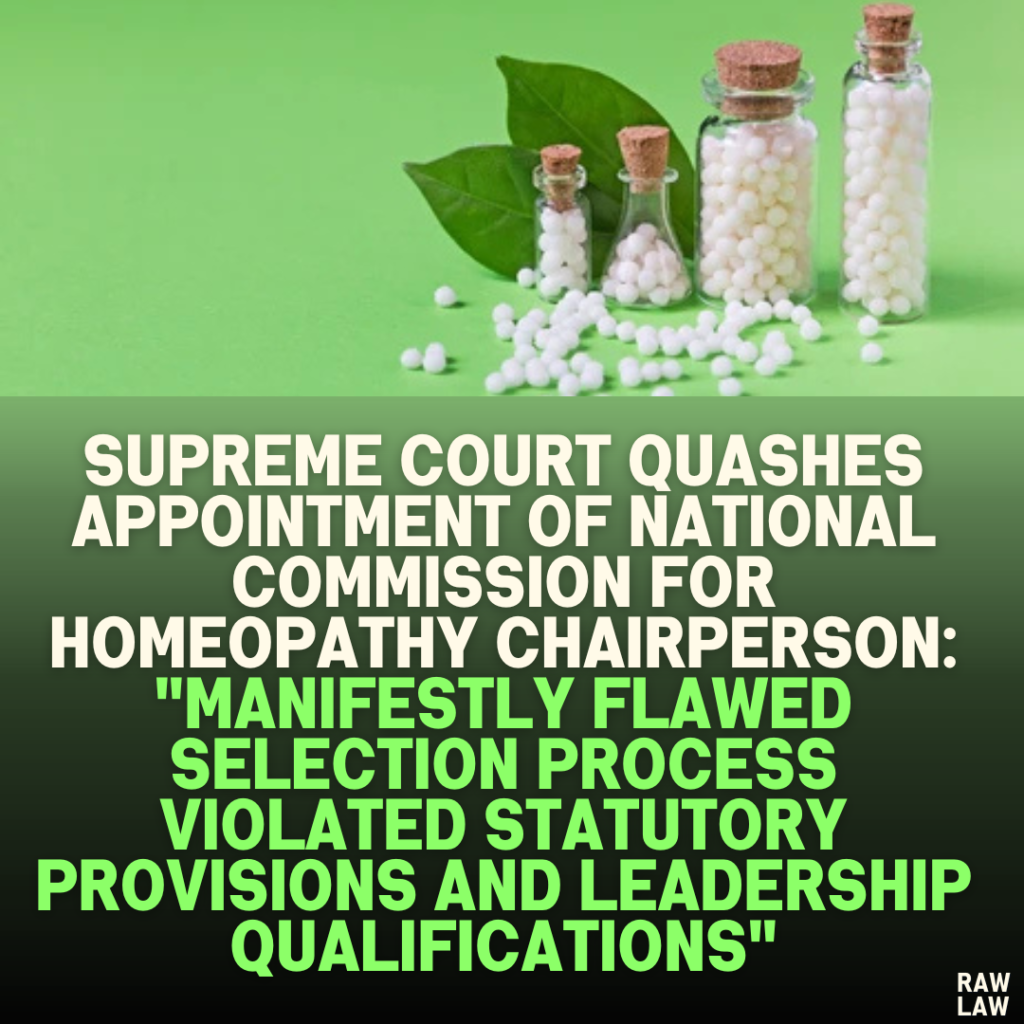Court’s Decision
The Supreme Court quashed the appointment of the Chairperson of the National Commission for Homeopathy (NCH), holding that the selection process violated statutory provisions. The Court emphasized that the respondent lacked the mandatory qualifications outlined in the NCH Act. It restored the earlier Single Judge decision of the High Court that had invalidated the appointment. Additionally, the Court directed the respondent to vacate the post within a week while ensuring no future benefits accrue to him from the invalidated position. A fresh selection process was ordered to ensure compliance with the statutory rules.
Facts
- The NCH Act, 2020, governs appointments to the National Commission for Homeopathy. Section 4 mandates that the Chairperson must have:
- At least 20 years of experience in the field of homeopathy.
- A minimum of 10 years as a “leader,” defined as a “Head of a Department” or “Head of an Organisation.”
- In January 2021, the Ministry of AYUSH issued a notification inviting applications for the Chairperson position, listing these criteria. Thirty-seven individuals, including the appellant and the respondent, applied.
- The respondent, who served as the Director General of the Central Council for Research in Homeopathy (CCRH), was selected as Chairperson based on recommendations by the Search Committee.
- The appellant challenged the appointment before the Karnataka High Court, alleging the respondent did not meet the statutory requirement of 10 years’ leadership experience.
- The Single Judge ruled in favor of the appellant, holding the respondent ineligible. However, this decision was overturned by a Division Bench, leading to the Supreme Court appeals.
Issues
- Eligibility: Did the respondent possess the requisite 10 years’ leadership experience as mandated by the NCH Act?
- Judicial Review: To what extent can courts intervene in the decisions of expert selection committees?
- Procedural Fairness: Was the selection process conducted transparently and in compliance with statutory provisions?
Petitioner’s Arguments
- The respondent failed to satisfy the statutory requirement of 10 years as a “Head of a Department” or “Head of an Organisation.”
- The Search Committee improperly bypassed the statutory criteria, rendering the appointment illegal.
- The Division Bench erred in limiting its scrutiny of the selection process.
Respondent’s Arguments
- The respondent’s experience as Assistant Director and other roles in CCRH amounted to leadership under the statutory definition.
- The Secretary, Government of India, certified the respondent’s eligibility after reviewing the “documents of experience.”
- Courts should defer to the findings of expert committees unless there is evidence of mala fide actions or procedural violations.
Analysis of the Law
- Mandatory Nature of Eligibility Criteria: The Court reaffirmed that statutory qualifications prescribed under Section 4 of the NCH Act are mandatory and non-relaxable. It held that any deviation from these requirements undermines the legitimacy of public appointments. The Court cited Alka Ojha v. Rajasthan Public Service Commission, emphasizing that eligibility criteria must be strictly enforced.
- Limited Scope of Judicial Review: Judicial review in selection matters is limited to examining compliance with statutory provisions and procedural fairness. Citing University of Mysore v. C.D. Govinda Rao, the Court noted that while courts must respect expert opinions, they can intervene where statutory violations or procedural lapses are evident.
- Leadership Definition: The Court examined the statutory definition of “leader” and concluded that it required the candidate to be in a position of substantial authority, involving decision-making and administrative responsibility. Supervisory or subordinate roles do not meet this threshold.
- Equivalence Determination: The Secretary’s certification that the respondent’s experience was “equivalent” to leadership was found to be arbitrary and unsupported by evidence. The Court relied on N.P. Verma v. Union of India, which held that equivalence must be determined through a transparent and reasoned process.
Precedent Analysis
The Court referred to multiple precedents to frame its analysis:
- University of Mysore v. C.D. Govinda Rao: Limited judicial review in appointments unless statutory violations are evident.
- Alka Ojha v. Rajasthan Public Service Commission: Mandatory qualifications cannot be waived or relaxed.
- Mahesh Chandra Gupta v. Union of India: Judicial review applies to eligibility, not suitability.
- M. Tripura Sundari Devi: Deviations from statutory rules in public appointments amount to fraud on the public.
Court’s Reasoning
- Non-Compliance with Eligibility Criteria: The Court found that the respondent’s experience as Assistant Director and subsequent roles did not qualify as leadership. The organizational hierarchy showed that these roles were subordinate to the Deputy Director General, who was the actual head of the department.
- Lack of Procedural Fairness: The Court criticized the Search Committee for failing to resolve doubts about the respondent’s eligibility transparently. The Committee’s minutes did not explain how these doubts were addressed, raising concerns about procedural irregularities.
- Flawed Equivalence Certification: The Secretary’s determination of equivalence was unsupported by any concrete evidence, making it legally unsustainable.
- Malice in Law: The Court held that the appointment exhibited “malice in law,” as it deviated from statutory requirements without lawful justification.
Conclusion
The Supreme Court quashed the respondent’s appointment as Chairperson of the NCH, directing him to step down within a week. A fresh selection process was ordered, ensuring adherence to the NCH Act. The Court emphasized that public appointments must be fair, transparent, and compliant with statutory provisions.
Implications
- Reaffirmation of Rule of Law: The judgment underscores the importance of adhering to statutory criteria in public appointments.
- Checks on Administrative Discretion: It highlights the judiciary’s role in ensuring transparency and fairness in selection processes.
- Impact on Public Employment: The ruling serves as a precedent for stricter scrutiny of appointments to public offices, particularly where statutory violations are alleged.
This detailed analysis reflects the Court’s meticulous evaluation of the case and its broader implications for public appointments.



